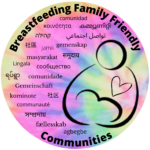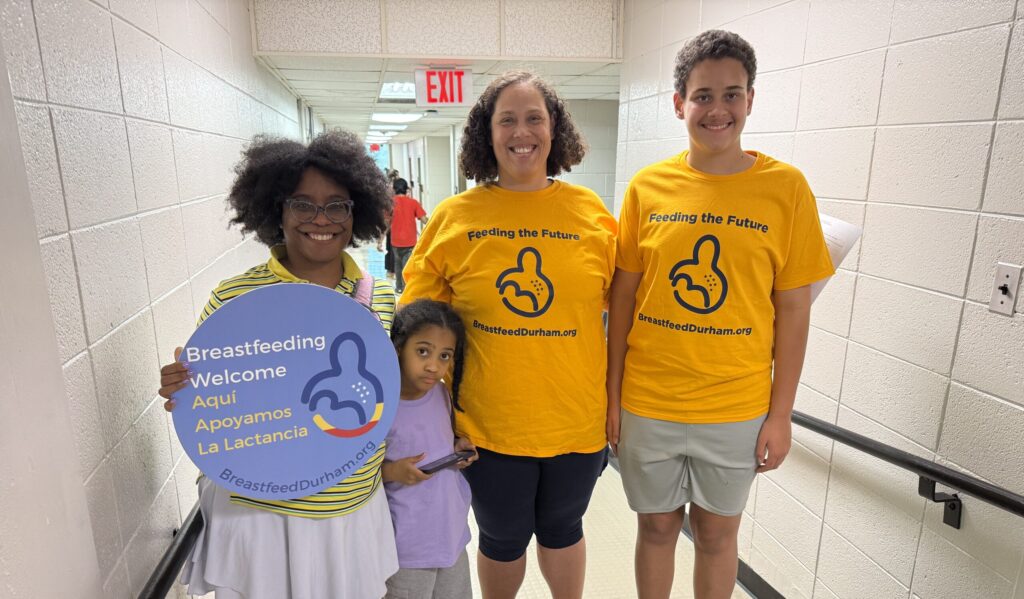What does it take to truly normalize breastfeeding across educational spaces? In Durham, North Carolina, it began with trust, persistence, and deep listening. In this article, Julianne Williams, a recent intern with Breastfeed Durham, shares her personal journey supporting the implementation of Step 10 of the Ten Steps to a Breastfeeding Family Friendly Community. Her reflection is followed by practical advice for other regional coalitions working to integrate breastfeeding into curriculum, policy, and campus life—from childcare to higher education.
Working with Breastfeed Durham has been one of the most inspiring and transformative experiences of my life. When I first joined the team, I didn’t fully realize how much persistence, patience, and heart it would take to create real change. I quickly learned that meaningful progress depends on building strong, genuine relationships within the community. Change happens when people trust you, and trust takes time, consistency, and a lot of listening.
Since May 2022, our team has sent hundreds of emails, attended countless meetings, and stayed engaged even as school board members, administrators, and staff changed around us. Some days it felt like we had to start all over again, reintroducing ourselves, sharing our goals, and reminding people why creating breastfeeding-friendly environments matters so much. We tried a variety of approaches, from proposing proclamations to hosting presentations, and even simple one-on-one conversations. It was through this steady, personal outreach that we began to hear real stories from families, teachers, and students. Those stories grounded and motivated us, reminding us that every small step made a difference. Then, years later I started with Breastfeed Durham for my final year of my program and from the community building and foundation laid by everything, we are continuing the momentum for change.
During my time with Breastfeed Durham, I had the opportunity to be directly involved in many exciting efforts that helped move our work forward. I participated in Breastfeed Durham’s gala, where we celebrated community milestones and strengthened important partnerships. I helped distribute breastfeeding sanitation kits in the Asheville area, making it easier for them to support lactating families. I also conducted in-person outreach at Durham Technical Community College and Durham Public Schools, meeting directly with staff and administrators to advocate for breastfeeding-friendly policies and drop off breast-feeding friendly curricula. Those face-to-face conversations were some of the most powerful moments, because hearing the challenges and triumphs of breastfeeding made the work feel so real and urgent. Every session, meeting, and event helped lay the groundwork for stronger, more supportive environments for families across Durham.
I am deeply grateful to have been part of an organization that truly lives its mission of uplifting and supporting families. Breastfeed Durham showed me that true advocacy is not just about speaking for others, but about standing with them, creating space for their voices, and providing meaningful resources. Being part of this community-driven effort has been humbling and inspiring.
This experience taught me that even when change feels slow, every conversation matters. Every relationship planted a seed, and when we take a step back, we can see just how much has grown over time. I am proud to be part of a movement that continues to center the needs and hopes of our community. Thank you so much to Love and the team for allowing me to learn in this role and be a part of this journey.
Julianne Williams, MPH Policy and Management Candidate at Temple University
Advice for Communities Completing Step 10
How to Normalize Breastfeeding in Educational Spaces
Implementing Step 10—“Integrate breastfeeding education into curriculum and community norms”—takes more than a checklist. It takes trust, persistence, and community leadership. Based on our experience in Durham, here are a few suggestions for other coalitions ready to begin or deepen this work:
1. Start with Relationships, Not Just Rules
Before introducing policies or curricula, take time to connect with the people who shape educational spaces—teachers, school nurses, Title IX coordinators, childcare directors, and students themselves. Ask about their challenges. Offer your support. Relationships open doors that cold outreach won’t.
2. Use Real Stories to Build Understanding
Invite parents, students, and educators to share their lactation experiences. A story about pumping in a closet or being denied class time can often move hearts—and policies—more effectively than data alone.
3. Frame the Work as Educational Equity
Highlight how breastfeeding intersects with student success, maternal health, and inclusive learning environments. Center Title IX, mental health, and academic performance when making your case to school leaders and staff.
4. Offer Easy-to-Use Tools
Provide institutions with flyers, sample syllabi, training slides, signage, or social media graphics. Reduce the burden on educators and administrators by offering ready-made resources that can be customized.
5. Celebrate Small Wins Publicly
Did a school designate a lactation space? Did a teacher include breastfeeding in a health unit? Did a college post lactation policy updates online? Celebrate it! Public recognition encourages others to act.
6. Integrate Across Age Groups
- Childcare & Early Education: Normalize breastfeeding in daily routines and classroom books
- K–12 Schools: Add age-appropriate lessons about infant feeding to health, science, or family life classes
- Colleges & Universities: Advocate for Title IX implementation, campus lactation spaces, and professional training on lactation equity
7. Stay Consistent, Even When Leadership Changes
You may have to reintroduce yourself again and again as staff and school board members rotate. That’s part of the process. Stay visible, stay kind, and keep going.

